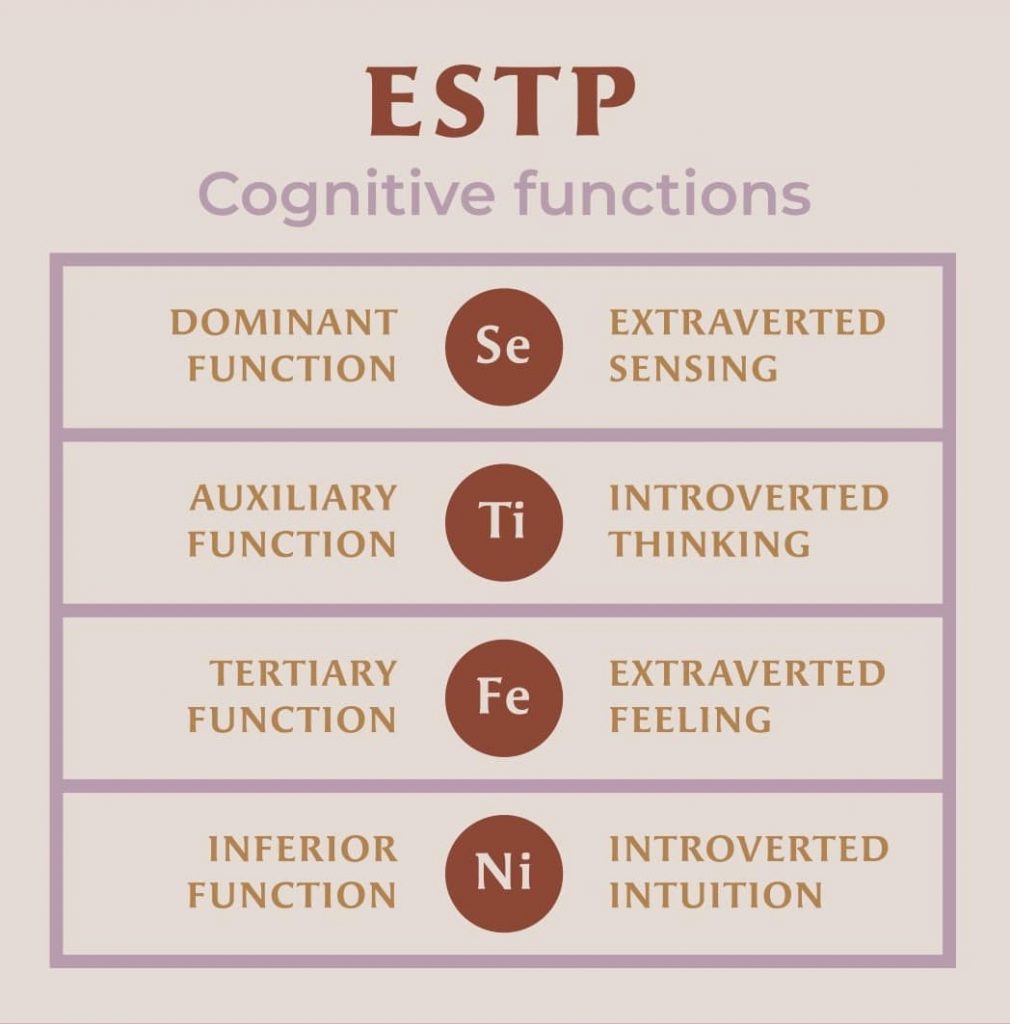ESTP – The Entrepreneur
ESTP Meaning:
The ESTP personality type consists of Extraverted, meaning they derive their energy from engaging with other people and the outside world, Sensing, in that they prefer to use information obtained directly through the five senses Thinking, in that they reason using objective and logical data and analysis; as well as Perceiving, in that they are not rigid or necessarily organized in any given approach, and prefer to work with new information as it presents itself. Other names for the ESTP personality type include the Promoter, the Promoter Executor, the Supreme Realist, as well as the Dynamo. Proportionally to the rest of the population, the ESTP personality type consists of 4 percent, with 6 percent of all men reporting in as an ESTP and only 3 percent of women.
ESTPs tend to be very positive and optimistic individuals. They are fundamentally realistic in their world and their beliefs; however, they also display a profound propensity to adapt and change with the external world. This pragmaticism allows them to live a life unbound and with a sense of freedom. ESTPs possess a realistic perspective that is based on the here and now and on established evidence and fact. They do not tend to tread in the realm of the abstract or idealism and would much rather embrace and explore more immediate and practical endeavors.
ESTPs are also constantly on the lookout for the next opportunity or adventure. They enjoy engaging the world on their terms, and although they are pragmatic and easy-going, they address issues and problems as they arise, and do so in a practical and efficient manner.
Given their alternative names of Dynamo and Promoter, it is unsurprising that the ESTP is rather spontaneous in their approach to the world and will often change direction or pursuit on a whim. ESTPs also tend to be rapid and hands-on learners. This disposition makes for an eclectic, diverse, and robust skillset on the part of the ESTP. However, this dynamic and fluid approach also makes for a point of contention amongst others within a workplace or a relationship. The ESTP can be perceived as becoming easily bored and shallow in their interests and pursuits.
ESTPs can also be particularly overindulgent in their interests and physical pleasures, to the point of being perceived as lustful and decadent in their lifestyle. Regardless, ESTPs are often considered gregarious, influential, and, above all else, fascinating to those around them.

ESTP and Career:
As the ESTP is present in the here and now and not interested in the abstract, they prefer to solve practical problems with immediate results. Given their Perceiving preference, they gravitate to workplaces and environments that are less rigid and more lax. They like to apply themselves through bursts of brilliance and are often unable to satisfy this compulsion with a job that is both rigorous in structure and rules.
Also, given their extraversion, ESTPs prefer a work environment that has many people and personalities to interact with. They are often the center of attention and the office social butterfly. They genuinely love engaging with others and hearing their stories, interests, and motivations. They have a unique perspective that is driven primarily by the practical and therefore conducive to professions that come across many practical problems that require immediate solutions on any given day.
ESTP as Direct Reports:
Similar to their fellow ESP counterpart, the ESFJ, the ESTP prefers a workplace that is light, fun, and interactive. They are enthusiastic team players and get along best with those who are as well. The ESTP may come across as casual and rather devil-may-care in their work style and approach. While this is far from the case, and ESTP takes a particular pride in a job well done, this can be the perception from their more Judging and Sensing colleagues and leaders. This can cause friction and resentment within the workplace that can potentially boil up to conflict if not tended to or alleviated.
The ESTP will speak up and voice their discontent or disagreement, especially if they see little to no practical value in any given proposed direction or idea. This can create a tense work environment, especially for those who are less inclined towards conflict within the workplace. As such, the leader of any given team with an ESTP must be careful to ensure that they do not become a ‘ring leader,’ resulting in some of the team members feeling neglected, unheard, and unrepresented.
ESTP as Leaders of Others:
Unsurprisingly, ESTPs typically thrive as leaders. However, they thrive in particular professions and work environments. They lead primarily through their emotional intelligence, which allows them to persuade, convince, and rally the team behind and towards and given goal or task. The ESTP can be inspiring, gregarious, charming, and captivating. They can be defined as modern-day sophists. This power of persuasion often results in leadership based on respect and admiration, and which is rarely questioned or challenged. However, the ESTP can also tend towards a cult of personality scenario if they are not careful and should ensure they do not surround themselves with or only listen to ‘yes men.’
ESTPs are particularly strong as leaders when they lead a team that requires quick and effective decision-making. The more controversial the decision, idea, or direction, the brighter the ESTP shines. However, as the ESTP is highly effective in the here and now, they tend to be less concerned and rather challenged when it comes to organizing or planning the future. The farther ahead the planning is required, the more challenging it becomes for the ESTP. They prefer to work with practical reality, and the farther they try and plan into the future, the more variables come from all directions, and the further the line blurs from the realm of the practical to the realm of theory.
ESTP Professions:
As such, the ESTP has the potential to thrive and excel in a variety of professions and careers. They are vital in any job that involves interacting with others on a constant basis, such as an Airline Attendant, a Bartender, a Hotel Receptionist, a Hotel Manager, a Fitness Instructor, an Athletic Trainer, a Sales Manager, and a Sales Associate.
However, this is not to say that the ESTP will instantly be successful and excel at any of these careers. However, it is to say that the nature of the work is highly compatible with the style, values, and preferences of the ESTP. This compatibility generates a higher chance for fulfillment in their profession and therefore is conducive to being more successful and ambitious within it.
And, just as some careers and professions are more conducive to success for the ESTP, there are also those that the ESTP may find more challenging, less satisfying, and less fulfilling. These include professions and careers that have little contact and interactions with other people, those that require long-term and strategic planning., as well as those that have rigid rules and structure in place. These include Analysts, Writers, Economists, Organizational Psychologist, College or University Professor, Librarians, Technicians, and most of the STEM-related fields.
Again, this is not to say that the ESTP would not be highly effective in these roles. Instead, they may find it more challenging from an engagement perspective and may find less contentment in the nature of the job on a fundamental and intrinsic level.
ESTP and Interpersonal Relationships:
In interpersonal relationships, ESTPs tend to have vast social circles that consist of an eclectic blend of many different personality types. The ESTP enjoys and prides themselves on their ability to converse with all manners of people and personalities and truly enjoys being the center of attention in any given social setting.
However, ESTPs are spontaneous by nature and somewhat disorganized in their planning and looking ahead. As such, it can be challenging to make set plans with an ESTP, and, even if those plans are made, the ESTP may forget or simply opt to do something they find more interesting that arises after the plans have been made. This can give the ESTP a reputation for being flaky. As magnetic and captivating as the ESTP is, this eventually leads to frustration and contention for others, especially for the more Judging personality types.

ESTP in Friendships:
ESTPs are bold and adventurous and have been known to be called thrill-seekers and adrenaline junkies. As such, ESTPs enjoy surrounding themselves with those who are similar in temperament and perspective towards the outside world. Above all else, they do not appreciate those who criticize their lifestyle or choices and will not hesitate to make their disposition known. ESTPs are also very volatile and explosive in their thoughts and their actions, and those that do not appreciate or who cannot keep up with this style tend to frustrate the ESTP.
The ESTP will therefore find fast friends with those who have similar values, beliefs and approaches to the world. ESTPs are particularly drawn towards fellow Thinkers, as their very rationale and how they approach the world is similar. The most compatible personality types for the ESTP include the ISTP (Introvert, Sensing, Thinking and Perceiving), the ESTJ (Extravert, Sensing, Thinking and Judging), the ENTP (Extravert, Intuitive, Thinking and Perceiving) as well, of course, as fellow ESTPs. However, similar to profession and personality type, as is the case with personality types and relationships. There are those who are more aligned on a fundamental level than others. While this does not automatically guarantee the two personalities will necessarily get along, it does provide more fertile ground to bond over, with higher chances of meaningful relationships being formed.
And, given this, there are also personality combinations that may be at odds as well. For the ESTP, these tend to include personality types that have a preference for Feeling as opposed to Thinking and include the ISFJ (Introvert, Sensing, Feeling and Judging), the INTP (Introvert, Intuitive, Thinking, and Perceiving), the INFP (Introvert, Intuitive, Feeling and Perceiving), and, the INFJ (Introvert, Intuitive, Feeling and Judging).
Again this is not to say that these personality types cannot be successful and long-lasting. However, it is to say that these relationships may be challenging for both personality types, given very distinct differences on a fundamental level.
ESTP in Romantic Relationships:
In romantic relationships, the ESTP is caring, affectionate, and often enamored. They have a deep appreciation for physical beauty in particular and can indeed be considered to be shallow or superficial by some. This is not the case, however, as the ESTP is simply channeling their preference for Sensing. They are emphatic and spontaneous lovers who enjoy keeping things novel and exciting.
While this is incredibly potent in the beginnings of a relationship, it can become a point of contention as the relationship matures. ESTPs may grow bored of a current relationship and quickly become restless and reckless, looking to find new excitement and thrill. In this sense, they can sometimes appear as lustful.
It is therefore vital for the ESTP to be upfront about their expectations and values in a relationship, and, although they do not particularly enjoy talking about their Feelings given their Thinking preference, they should be honest and upfront with their partner at all stages of the relationship, lest their intentions and desires become misrepresented or miscommunicated.
ESTP and Families:
While ESTPs may not have a particular penchant for responsibility, they tend to make fun and exciting parents. They will often instill their sense of adventure and thrill-seeking into their children and truly appreciate when their children can enjoy life at its fullest alongside them.
Conclusion:
The ESTP is a genuinely captivating and magnetic personality. They are gregarious and charming with a strong power of persuasion. They love to be around people and enjoy large social circles. They do not enjoy structure or rigidity in their daily life, both personally and professionally. They are rapid thinkers that prefer to surround themselves with those that can keep up and appreciate this.
ESTPs make for exciting partners and parents as well. They are constantly looking for new and novel ways to engage their families and the world. However, ESTPs must be careful not to completely disregard responsibility and consequence, lest they run the risk of displaying reckless behavior.
You can find information on famous people with ESTP personality types such as celebrity actors, sportsmen, characters and other historical characters with this personality type.







